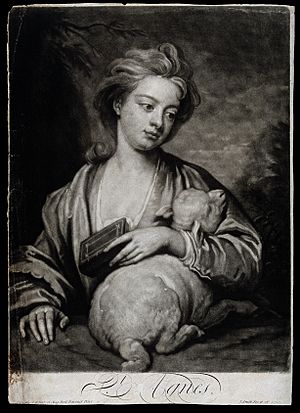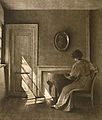Mezzotint facts for kids
Mezzotint is a special way of making prints. It's part of the intaglio family, which means the image is printed from lines or areas that are cut into a surface. Mezzotint was the first printing method that could create smooth shades of gray, from very light to very dark. This means artists didn't need to use lines or dots to show different tones.
To make a mezzotint, an artist uses a tool called a "rocker." This tool has tiny teeth and is used to roughen a metal plate. It creates thousands of tiny dots and pits on the plate's surface. When the plate is inked, these tiny pits hold the ink. Then, the artist wipes the surface clean, but the ink stays in the pits. When paper is pressed onto the plate, the ink transfers, creating a rich, soft-looking print.
History and Use of Mezzotint
Mezzotint is often used with other printing methods, like etching or engraving. It became very popular in England during the 1700s. Artists used it a lot to make copies of portraits and other paintings. It was a competitor to another shading technique called aquatint.
After the mid-1800s, mezzotint became less common. Other methods, like lithography, could create similar results more easily. Still, some famous artists in the 20th century used mezzotint. These include Robert Kipniss, Peter Ilsted, and even M. C. Escher, who made eight mezzotints.
Images for kids
See also
 In Spanish: Grabado a media tinta para niños
In Spanish: Grabado a media tinta para niños
 | George Robert Carruthers |
 | Patricia Bath |
 | Jan Ernst Matzeliger |
 | Alexander Miles |







